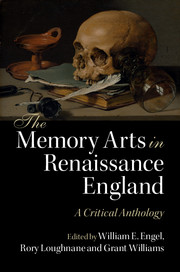Book contents
- Frontmatter
- Dedication
- Contents
- List of figures
- Acknowledgements
- A note on abbreviations
- Introduction
- PART I The art of memory
- PART II Rhetoric and poetics
- PART III Education and science
- PART IV History and philosophy
- Introduction to Part IV
- IV.1 Lodowick Lloyd, The Pilgrimage of Princes (1573)
- IV.2 William Camden, Remains Concerning Britain (1605)
- IV.3 Francis Bacon, The Advancement of Learning (1605)
- IV.4 Pierre Charron, Of Wisdom (1608)
- IV.5 John Weever, Ancient Funeral Monuments (1631)
- IV.6 Edward Reynolds, A Treatise of the Passions and Faculties (1640)
- IV.7 Thomas Fuller, selected works
- IV.8 Kenelm Digby, Two Treatises (1644)
- IV.9 Thomas Hobbes, Leviathan (1651)
- IV.10 William Dugdale, Baronage of England (1675–1676)
- PART V Religion and devotion
- PART VI Literature
- Index
- References
IV.8 - Kenelm Digby, Two Treatises (1644)
from PART IV - History and philosophy
Published online by Cambridge University Press: 05 August 2016
- Frontmatter
- Dedication
- Contents
- List of figures
- Acknowledgements
- A note on abbreviations
- Introduction
- PART I The art of memory
- PART II Rhetoric and poetics
- PART III Education and science
- PART IV History and philosophy
- Introduction to Part IV
- IV.1 Lodowick Lloyd, The Pilgrimage of Princes (1573)
- IV.2 William Camden, Remains Concerning Britain (1605)
- IV.3 Francis Bacon, The Advancement of Learning (1605)
- IV.4 Pierre Charron, Of Wisdom (1608)
- IV.5 John Weever, Ancient Funeral Monuments (1631)
- IV.6 Edward Reynolds, A Treatise of the Passions and Faculties (1640)
- IV.7 Thomas Fuller, selected works
- IV.8 Kenelm Digby, Two Treatises (1644)
- IV.9 Thomas Hobbes, Leviathan (1651)
- IV.10 William Dugdale, Baronage of England (1675–1676)
- PART V Religion and devotion
- PART VI Literature
- Index
- References
Summary
About the author
Kenelm Digby (1603–65), a founding and governing member of the Royal Society, was among the first to note the importance of ‘vital air’ (oxygen) in vegetative growth. In connection with alchemical experiments, he invented the longneck wine bottle made of translucent glass to protect the contents from sunlight.
About the text
Although aware of Descartes's scientific work, Digby applies Aristotelian principles to develop an atomistic view of cognition in his two major philosophical treatises, The Nature of Bodies and On the Immortality of Reasonable Souls, published together in 1644. His chapter on memory explains the key principles underlying his mechanistic theory of the brain's operations.
The arts of memory
Digby treats the art of memory as a naturally occurring phenomenon in the world that replicates the internal pattern of human cognition. Adapting the earlier doctrine of correspondences (of microcosm mirroring macrocosm) to fit his anatomical observations, Digby stresses the particulate nature of bodies within bodies, viewing the human soul as a conscious monad – a thinking and memorative force – distinguished from mere material monads (animals) and vital forces (plants).
Textual notes
Kenelm Digby, Two treatises (Paris, 1644), Nn2v–Nn4v.
Two Treatises
Chapter 33. Of memory
But let us examine a little more particularly, how the causes we have assigned, do raise these bodies that rest in the memory, and do bring them to the fantasy. The middlemost of them (namely chance) needeth no looking into, because the principles that govern it, are uncertain ones. But the first, and the last (which are, the appetite, and the will) have a power (which we will explicate hereafter) of moving the brain and the nerves depending of it, conveniently and agreeably to their disposition.
- Type
- Chapter
- Information
- The Memory Arts in Renaissance EnglandA Critical Anthology, pp. 215 - 218Publisher: Cambridge University PressPrint publication year: 2016



